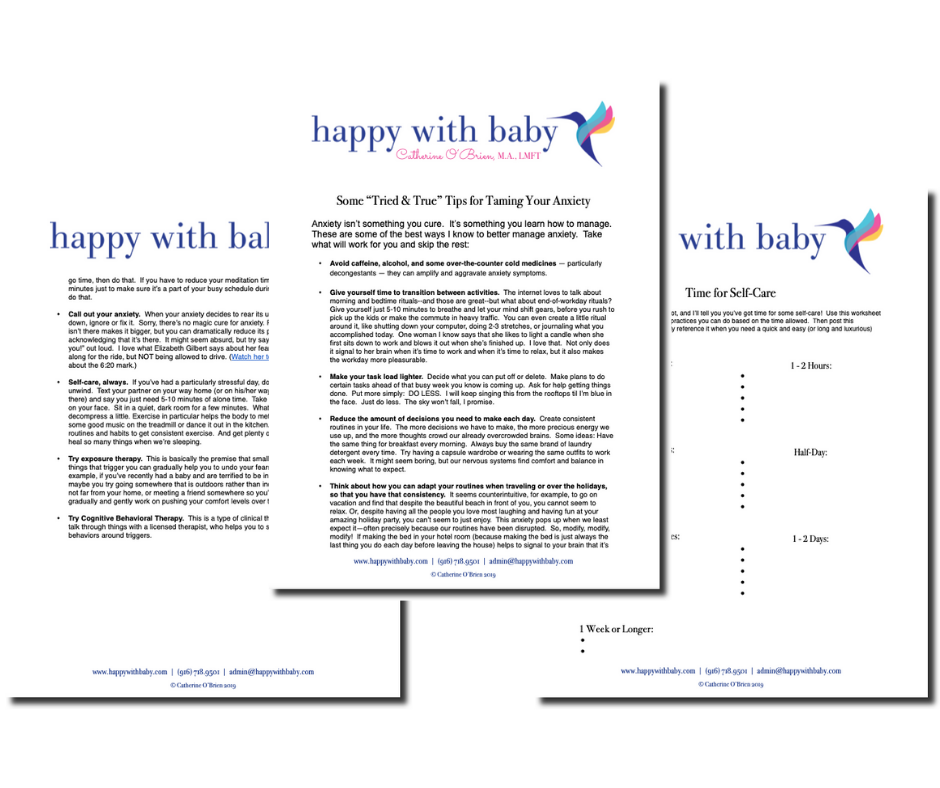I Didn't Realize I Had Anxiety

I’d never taken myself for one to suffer from anxiety. It was only in looking back at events in my life that I can now see what was actually going on.
Turns out, there has been a pretty consistent trend in my life: At every major transitional corner I’ve turned--every stressful point in my life--I’ve always gotten sick. I’m not talking about your run-of-the-mill cold and flu kind of thing. I’m talking SICK sick.
When I was in high school, I missed weeks of school due to severe illness. When I was finishing up my bachelor's degree, I was sick. When I got my MFT license, you guessed it--sick.
My body was screaming at me to slow down and pay attention. The funny thing is, my teachers were understanding--they told me not to worry about finals and were ready to let me off the hook for assignments and deadlines. But I didn’t get the memo my body was very clearly sending. I wanted to press on, show up for finals, and make up for lost time. You can probably guess that absolutely did not help matters.
It’s easy it write those instances off as just isolated high-stress points in my life, despite their right-on-time consistency. They were temporary, one-time phases and I did get through them, after all. And I’m self-reflective enough to see how I may have fed into those rough situations with my lack of skills in stress management or my lack of attention or my downright denial of body wisdom. (I was younger and less wise then, after all.)
The truth is, it wasn’t just those times. There were other moments my anxiety showed up in between, and in varying degrees of intensity. But for most of my life, it never occurred to me that it was anxiety.
In fact, I didn’t really think about it at all—until I suddenly didn’t feel good. Because everybody gets stressed now and then, right? It’s a part of life.
My big lightbulb moment finally came when I was sitting across from a client in my office who was describing a recent panic attack she had and what it physically felt like for her. That’s when I realized, WHOA, that has happened to me!
It was a few years ago when my kids were really small (my youngest was just a baby still), my family and I had decided to make an extended visit with some family that I hadn’t seen since I was probably four years old. I was maybe a little nervous about it, but as the visit went on, I wasn’t aware of feeling particularly stressed or uncomfortable. I actually thought the trip was going well. But, suddenly, a few days in, I didn’t feel very good.
I felt like I was hungover, except that I hadn’t been drinking at all. I had a pounding headache. Parts of my body felt tingly. I took some Advil and it didn’t seem to be doing much. I thought, I must be getting sick again, so I excused myself to go back to the room we were staying in to rest. Then suddenly, I felt like I was dying. I didn’t know what was wrong, but I knew I needed to get to the hospital. But what would we do with the kids? Do we leave them with extended family that the kids barely know? I thought, this must seem crazy--I must seem crazy. Or at least dramatic. But I couldn’t escape what my body was telling me.
So as my client was describing her anxiety experience, I realized that her story mirrored that memory of being at my family’s so well. I was stunned. How did I not see it before?
The reality is, I’m not alone. Many women don’t realize that what they’re experiencing is anxiety. I was just speaking with a friend before writing this who said that she was surprised to realize she had anxiety because she’s always prided herself on being “a multitasker who is cool under pressure." As if that would disqualify her. (I totally relate to that.)
I prodded further and learned that she also only realized through hindsight that she was suffering from anxiety as well (postpartum anxiety, in her case).
“I just thought I was bad at motherhood. I didn’t realize it was anxiety,” she told me.
She said she was terrified to go out in public with her baby for years and constantly watched the clock for when her husband would come home for the day, not necessarily for a break, but she somehow felt less insecure with him around.
She also said that she only recently realized that sometimes her anxiety would manifest as complaining (and she would then worry about turning her friends off) or getting snappy with her partner (when it wasn’t actually him she was annoyed with, it was just that she was already stressed and he didn’t know what he was walking into).
The reality is that 1 in 10 women will experience anxiety in their lives. It may surprise you to learn that that’s almost twice as likely as men.
There are a lot of reasons for this. One being the obvious: hormones. Women go through pretty dramatic hormonal changes in their lifetimes, both with our monthly cycles, and also depending on what phase of life we’re in. Not to mention, sometimes those hormonal balances can be influenced or disrupted by things like medications or adrenal fatigue.
But also, there are a lot of social and cultural reasons why this affects women more often than men. For one thing, we tend to carry the brunt of the household management, raising the kids, getting food on the table, etc. Being taken seriously in the workplace, the gender pay gap, lack of good maternity leave, etc. are other reasons (as if plain old work stress wasn’t enough). And of course, let’s not forget, sexual harassment, assault, and sexual trauma or abuse as another. Even sexist attitudes from our families or partners can increase our stress load.
There’s even research out there that shows that though there’s no difference in the size of the amygdalae (our “lizard brains”) in men and women, there are differences in how a woman’s amygdala operates when in fight or flight mode versus a man’s. For men, they tend to focus on action. For women, we tend to focus on thought and taking in details. For that reason, some believe that women are more likely to dwell on stressful situations or more vividly remember those situations.
It’s no wonder that anxiety is so easy for us to overlook. So many things we consider a “normal” part of being a woman are also things that put us at risk. But given the statistical likelihood of women being diagnosed with anxiety and the sheer bombardment of factors that can put women at greater risk, it’s so important for every woman to know the signs of anxiety, so that she can decide what’s normal and healthy or disruptive and out of balance for her and then find appropriate avenues of care.
So, let’s go over some common symptoms that could possibly show up.
SYMPTOMS TO WATCH FOR:
NOTE: Though these symptoms listed are signs of anxiety, they don’t always mean you have anxiety. Sometimes there can be very real, very serious health conditions that are causing your symptoms, such as heart disease, hyperthyroidism, and others. So ALWAYS consult your doctor to rule these and other health conditions out first, before assuming it must be anxiety.
PHYSICAL:
-
Digestive issues - nausea, IBS, diarrhea, upset stomach, constipation, changes in appetite
-
Frequent urination
-
Sleep trouble - trouble falling asleep or trouble staying asleep
-
Heart palpitations or racing heart rate
-
Sweaty palms
-
Shaky hands
-
Dry mouth
-
Frequent or severe skin flare-ups like rosacea, flushing, rashes
-
Aches and pains - often in the neck, back - or tight hips (fight or flight muscles), chest tightness
-
Short, shallow breathing
-
Frequent headaches or migraines
-
Tremors or twitching
MENTAL:
-
Excessive worry - “excessive” is often defined as “as often as every day and for a period of at least six months” or disrupting your normal habits or lifestyle.
-
Trouble concentrating
-
Feelings of apprehension or dread
-
Feeling tense or jumpy
-
Always assuming the worst or constantly watching out for signs of danger
-
Restlessness
-
Irritability - feeling like you have a “shorter fuse”
There are even some signs of high-functioning anxiety that can be easy to overlook, like:
-
being highly detail-oriented
-
needing to control your environment
-
planning far ahead to avoid unknowns
-
fidgeting or having a nervous habit like biting nails or grinding your teeth
-
having trouble listening to others because you’re preoccupied with your own thoughts
SIGNS YOU’RE HAVING A PANIC OR ANXIETY ATTACK:
-
Palpitations, pounding heart, or accelerated heart rate
-
Sweating
-
Trembling or shaking
-
Feeling like it’s hard to breathe
-
Feelings of choking
-
Chest pain or discomfort
-
Nausea or stomach upset
-
Feeling dizzy, unsteady, lightheaded, or faint
-
Chills or hot flashes
-
Numbness or tingling
-
Feelings of unreality or feeling like you’re outside of yourself
-
Fear of losing control or “going crazy”
-
Fear of dying
*It’s important to understand that a panic attack can be triggered by a stressful situation or it can seemingly spring on us out of nowhere.
THE FIRST STEP TO MANAGING YOUR ANXIETY
There are many tips and tricks out there for what you can do to better manage your anxiety. But first things first. You have to take note of what your body’s unique anxiety cues are to begin to understand, first, whether you have anxiety at all, and second, how it shows up, so that you can begin to understand how to give yourself what you need in those triggering moments.
Really, this is just self-care 101: Pay attention to your body’s cues and wisdom. And make it a regular habit BEFORE you get sick or burnout hits.
Do regular check-ins with yourself throughout your day. Ask, what is your body telling you right now? Is your heart racing? Does your back hurt? Are skin issues flaring up? Where do you feel stiff or stagnant? You might want to jot notes down of your little observations to see what patterns arise over time.
Then ask yourself, what’s one small thing I can do to give my body what it needs? Even if all you can manage right now is drinking a glass of water or having a good cry.
Remember that anxiety doesn’t always look the way we expect it to. Be patient with yourself as you try to learn what your body is telling you. And if you need more support, always, always reach out for help.
It can be really easy to vilify your anxiety for wrecking your plans or making your life harder. But, really, your anxiety is your nervous system looking out for you. Your anxiety just wants you to take care of yourself. Can you blame it?

Sign up to get the latest weekly blogs sent straight to your inbox


0 comments
Leave a comment
Please log in or register to post a comment